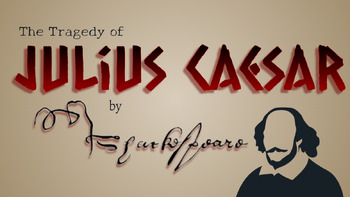Julius Caesar Act III Study Guide
Library Late Fees
0 Followers
Grade Levels
8th - 12th
Subjects
Resource Type
Standards
CCSSRL.9-10.1
CCSSRL.9-10.2
CCSSRL.9-10.3
CCSSRL.9-10.4
CCSSRL.9-10.5
Formats Included
- Google Docs™
Library Late Fees
0 Followers

Made for Google Drive™
This resource can be used by students on Google Drive or Google Classroom. To access this resource, you’ll need to allow TPT to add it to your Google Drive. See our FAQ and Privacy Policy for more information.
Also included in
- Students will explore the first three acts of Shakespeare's Julius Caesar with these study guides.Price $16.45Original Price $23.50Save $7.05
Description
Work through Act III of Shakespeare's Julius Caesar with this two-page study guide. (Page numbers refer to the Folger's Shakespeare Edition of Julius Caesar.)
Total Pages
Answer Key
N/A
Teaching Duration
N/A
Report this resource to TPT
Reported resources will be reviewed by our team. Report this resource to let us know if this resource violates TPT’s content guidelines.
Standards
to see state-specific standards (only available in the US).
CCSSRL.9-10.1
Cite strong and thorough textual evidence to support analysis of what the text says explicitly as well as inferences drawn from the text.
CCSSRL.9-10.2
Determine a theme or central idea of a text and analyze in detail its development over the course of the text, including how it emerges and is shaped and refined by specific details; provide an objective summary of the text.
CCSSRL.9-10.3
Analyze how complex characters (e.g., those with multiple or conflicting motivations) develop over the course of a text, interact with other characters, and advance the plot or develop the theme.
CCSSRL.9-10.4
Determine the meaning of words and phrases as they are used in the text, including figurative and connotative meanings; analyze the cumulative impact of specific word choices on meaning and tone (e.g., how the language evokes a sense of time and place; how it sets a formal or informal tone).
CCSSRL.9-10.5
Analyze how an author’s choices concerning how to structure a text, order events within it (e.g., parallel plots), and manipulate time (e.g., pacing, flashbacks) create such effects as mystery, tension, or surprise.




